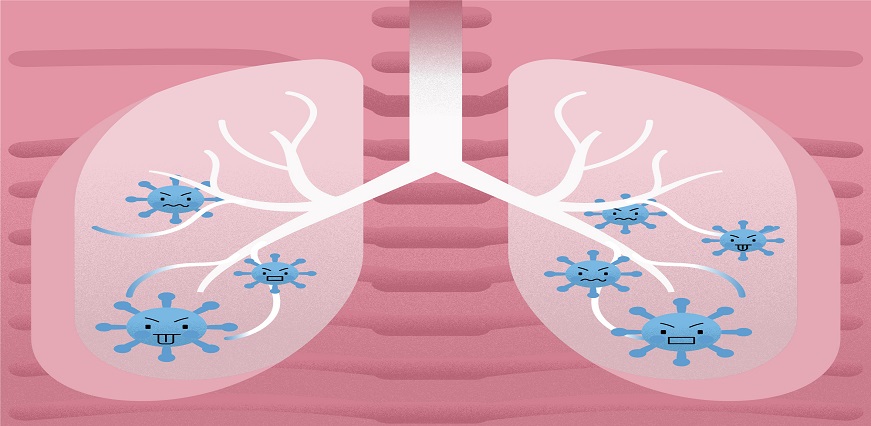

Home > Lab Tests in Karnal > Sputum AFB Culture Test
₹ 750
|
|
Sputum AFB Culture Test |
|
|
Sputum AFB Test, Sputum AFB Culture Test, |
|
|
Sputum |
|
|
|
|
₹ 750 |
@3x.png) Description
Description
Acid-fast bacillus (AFB) is a bacterial strain responsible for tuberculosis and other specific infections. Tuberculosis also referred to as TB, is a severe bacterial infection primarily impacting the lungs. However, it can also affect other body parts such as the brain, spine, and kidneys. Transmission of TB occurs through respiratory droplets expelled during coughing or sneezing from an infected person to others.
The sputum AFB test in Karnal procedure, also referred to as the BK-TB bacteria test in Karnal, is utilized for diagnosing pulmonary tuberculosis. This test in Karnal involves examining the patient's sputum under a microscope to detect Acid Fast Bacillus (AFB). Tuberculosis is a prevalent infectious disease caused by Mycobacterium tuberculosis. Based on the results of the AFB sputum test in Karnal, two types of pulmonary tuberculosis can be identified: AFB-positive and AFB-negative. Despite their differences, both types exhibit similar symptoms and require similar treatment. In AFB-positive pulmonary tuberculosis, the test in Karnal shows positive results, indicating the presence of tuberculosis bacteria causing bronchial infections and lesions within the lung cavities. These findings are often observed in sputum samples. Common symptoms include persistent cough, continuous coughing, and coughing up blood. In contrast, AFB-negative pulmonary tuberculosis shows negative results on the AFB sputum test in Karnal.
AFB test in Karnals are categorized into two types.
AFB Smear: The AFB smear test in Karnal, also known as acid-fast staining, is a microscopic examination of clinical specimens to detect acid-fast bacilli, including Mycobacterium tuberculosis. This test in Karnal involves staining the specimen using techniques like the Ziehl-Neelsen stain or the auramine-rhodamine stain. Acid-fast bacilli retain the stain and appear as red or fluorescent rods under a microscope. The AFB smear test in Karnal provides a relatively quick and initial indication of mycobacterial infection, but it does not provide species identification or drug susceptibility information.
AFB Culture: The AFB culture test in Karnal involves the growth and isolation of acid-fast bacilli in a specialized culture medium. This test in Karnal is essential for species identification and drug susceptibility test in Karnaling. The collected specimen, such as sputum or tissue sample, is inoculated onto a suitable culture medium, such as Lowenstein-Jensen. The culture is incubated under specific conditions to allow the growth of mycobacteria. The resulting colonies can be further analyzed using biochemical test in Karnals or molecular methods for species identification and drug susceptibility test in Karnaling.
The AFB smear and AFB culture test in Karnals play crucial roles in diagnosing and managing tuberculosis (TB) and other mycobacterial infections. While the AFB smear test in Karnal provides initial screening, the AFB culture test in Karnal is necessary for definitive diagnosis, species identification, and determining appropriate treatment regimens based on drug susceptibility patterns.
At Max Lab, we offer competitive prices for the sputum AFB culture test in Karnal, ensuring affordability without compromising quality.
....Read More@3x.png) Description
Description
Acid-fast bacillus (AFB) is a bacterial strain responsible for tuberculosis and other specific infections. Tuberculosis also referred to as TB, is a severe bacterial infection primarily impacting the lungs. However, it can also affect other body parts such as the brain, spine, and kidneys. Transmission of TB occurs through respiratory droplets expelled during coughing or sneezing from an infected person to others.
The sputum AFB test in Karnal procedure, also referred to as the BK-TB bacteria test in Karnal, is utilized for diagnosing pulmonary tuberculosis. This test in Karnal involves examining the patient's sputum under a microscope to detect Acid Fast Bacillus (AFB). Tuberculosis is a prevalent infectious disease caused by Mycobacterium tuberculosis. Based on the results of the AFB sputum test in Karnal, two types of pulmonary tuberculosis can be identified: AFB-positive and AFB-negative. Despite their differences, both types exhibit similar symptoms and require similar treatment. In AFB-positive pulmonary tuberculosis, the test in Karnal shows positive results, indicating the presence of tuberculosis bacteria causing bronchial infections and lesions within the lung cavities. These findings are often observed in sputum samples. Common symptoms include persistent cough, continuous coughing, and coughing up blood. In contrast, AFB-negative pulmonary tuberculosis shows negative results on the AFB sputum test in Karnal.
AFB test in Karnals are categorized into two types.
AFB Smear: The AFB smear test in Karnal, also known as acid-fast staining, is a microscopic examination of clinical specimens to detect acid-fast bacilli, including Mycobacterium tuberculosis. This test in Karnal involves staining the specimen using techniques like the Ziehl-Neelsen stain or the auramine-rhodamine stain. Acid-fast bacilli retain the stain and appear as red or fluorescent rods under a microscope. The AFB smear test in Karnal provides a relatively quick and initial indication of mycobacterial infection, but it does not provide species identification or drug susceptibility information.
AFB Culture: The AFB culture test in Karnal involves the growth and isolation of acid-fast bacilli in a specialized culture medium. This test in Karnal is essential for species identification and drug susceptibility test in Karnaling. The collected specimen, such as sputum or tissue sample, is inoculated onto a suitable culture medium, such as Lowenstein-Jensen. The culture is incubated under specific conditions to allow the growth of mycobacteria. The resulting colonies can be further analyzed using biochemical test in Karnals or molecular methods for species identification and drug susceptibility test in Karnaling.
The AFB smear and AFB culture test in Karnals play crucial roles in diagnosing and managing tuberculosis (TB) and other mycobacterial infections. While the AFB smear test in Karnal provides initial screening, the AFB culture test in Karnal is necessary for definitive diagnosis, species identification, and determining appropriate treatment regimens based on drug susceptibility patterns.
At Max Lab, we offer competitive prices for the sputum AFB culture test in Karnal, ensuring affordability without compromising quality.
....Read MoreA sputum AFB test is a laboratory test used to diagnose tuberculosis (TB) infection. The test is performed by collecting a sample of sputum (mucus expectorated from the lungs) and examining it for the presence of acid-fast bacilli (AFB), the bacteria that cause TB.
AFB tests are typically requested for individuals who exhibit active TB symptoms. The tests check your sputum for the presence of AFB bacteria. The thick mucus that is coughed out from the lungs is known as sputum.
No, fasting is not required for the Sputum AFB Test.
The cost of a Sputum AFB Test in Karnal at Max Lab is Rs. 750.
Yes, you can book an online appointment for a Sputum AFB Test in Karnal and choose the home sample collection option. Our phlebotomist crew is fully licensed, trained, and certified to collect blood samples from home.
When making an online appointment for a Sputum AFB Test in Karnal with Max Lab, one has the option of selecting a home sample collection. The Test results will be made available online for download within 24 hours of sample collection, at which point anyone can consult their doctor and decide on the best course of treatment depending on their results.
Parameter Included
Test Recommended for
Recommended for age
Covid Safety

Respiratory Syncytial Virus, commonly known as RSV, is a highly contagious vi...Read More

Tuberculosis is a bacterial infection that is contagious in nature. Usually, ...Read More

Coughing up blood can be a sign of a serious medical condition, such as lung ...Read More

Tuberculosis is a bacterial infection that primarily affects the lungs. It ca...Read More